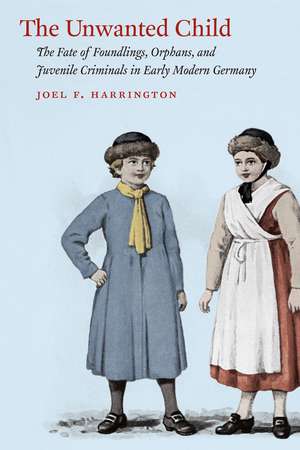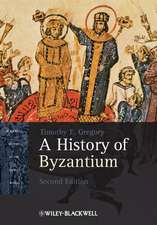The Unwanted Child: The Fate of Foundlings, Orphans, and Juvenile Criminals in Early Modern Germany
Autor Joel F. Harringtonen Limba Engleză Paperback – 17 oct 2013
The baby abandoned on the doorstep is a phenomenon that has virtually disappeared from our experience, but in the early modern world, unwanted children were a very real problem for parents, government officials, and society. The Unwanted Child skillfully recreates sixteenth-century Nuremberg to explore what befell abandoned, neglected, abused, or delinquent children in this critical period.
Joel F. Harrington tackles this question by focusing on the stories of five individuals. In vivid and poignant detail, he recounts the experiences of an unmarried mother-to-be, a roaming mercenary who drifts in and out of his children’s lives, a civic leader handling the government’s response to problems arising from unwanted children, a homeless teenager turned prolific thief, and orphaned twins who enter state care at the age of nine. Braiding together these compelling portraits, Harrington uncovers and analyzes the key elements that link them, including the impact of war and the vital importance of informal networks among women. From the harrowing to the inspiring, The Unwanted Child paints a gripping picture of life on the streets five centuries ago.
Joel F. Harrington tackles this question by focusing on the stories of five individuals. In vivid and poignant detail, he recounts the experiences of an unmarried mother-to-be, a roaming mercenary who drifts in and out of his children’s lives, a civic leader handling the government’s response to problems arising from unwanted children, a homeless teenager turned prolific thief, and orphaned twins who enter state care at the age of nine. Braiding together these compelling portraits, Harrington uncovers and analyzes the key elements that link them, including the impact of war and the vital importance of informal networks among women. From the harrowing to the inspiring, The Unwanted Child paints a gripping picture of life on the streets five centuries ago.
Preț: 276.84 lei
Nou
Puncte Express: 415
Preț estimativ în valută:
52.97€ • 55.31$ • 43.84£
52.97€ • 55.31$ • 43.84£
Carte tipărită la comandă
Livrare economică 05-19 aprilie
Preluare comenzi: 021 569.72.76
Specificații
ISBN-13: 9780226102054
ISBN-10: 022610205X
Pagini: 456
Ilustrații: 64 halftones, 9 line drawings
Dimensiuni: 152 x 229 x 30 mm
Greutate: 0.61 kg
Editura: University of Chicago Press
Colecția University of Chicago Press
ISBN-10: 022610205X
Pagini: 456
Ilustrații: 64 halftones, 9 line drawings
Dimensiuni: 152 x 229 x 30 mm
Greutate: 0.61 kg
Editura: University of Chicago Press
Colecția University of Chicago Press
Notă biografică
Joel F. Harrington is professor of history and associate provost for global strategy at Vanderbilt University. His books include Reordering Marriage and Society in Reformation Germany.
Cuprins
List of Illustrations
Note on Usage
Acknowledgments
INTRODUCTION
ONE / The Unmarried Mother
TWO / The Absconding Father
THREE / The Beleaguered Magistrate
FOUR / The Street Orphan
FIVE / The State Wards
SIX / From Micro- to Macro-: Individuals and the Big Picture
Appendix 1 / The Findelkinder Database
Appendix 2 / Known Infanticides in Nuremberg, 1384–1806
List of Abbreviations
Notes
Bibliography
Note on Usage
Acknowledgments
INTRODUCTION
ONE / The Unmarried Mother
TWO / The Absconding Father
THREE / The Beleaguered Magistrate
FOUR / The Street Orphan
FIVE / The State Wards
SIX / From Micro- to Macro-: Individuals and the Big Picture
Appendix 1 / The Findelkinder Database
Appendix 2 / Known Infanticides in Nuremberg, 1384–1806
List of Abbreviations
Notes
Bibliography
Index
Recenzii
“Only the best kind of historian can write compellingly about the past without slipping into anachronism. In his superb analysis of unwanted children in early modern Germany, Joel Harrington assembles some truly remarkable characters—the hapless, the heroic, the deeply cherished, and the never-loved. In telling their stories, he makes a distant time seem immediate and, with great subtlety, prompts readers to consider the fates of the helpless and uncherished today.”
“Joel Harrington’s wonderful new study of Nuremberg takes the story of unwanted children beyond the walls of the city’s chief charitable institution designed to receive them to the families and larger society that helped determine their fates. The author deconstructs the problem of ‘child abandonment,’ for example, by highlighting the various conditions that made life in the early modern city so precarious, especially for infants and children. Based on a wide variety of archival sources, the book uses the concept of the ‘circulation of children’ to explore the many ways—both informal and formal—that family networks and institutions tried to care for unwanted children, in many cases without success. Harrington skillfully uses the biographer’s and micro-historian’s tools to explore five examples of the kinds of people who figured prominently in dramas that surrounded unwanted children. He moves well beyond his local case study using his findings to address such topics as infanticide, out-of wedlock pregnancy, youth delinquency, and orphanhood in cross-national European perspective. All sorts of poor children and their families—from abandoned infants to teenage street children to absconding fathers and unwed mothers—come alive in the pages of The Unwanted Child.”
"Harrington breaks new ground with this work on children in early modern Nuremberg. . . . [This work] mounts a rich, successful challenge to top-down historical approaches to the subject."
“Harrington provides a fascinating examination of the problem of abandoned, orphaned, and neglected children in Nuremberg in the sixteenth and seventeenth centuries, offering a convincing reassessment of the impact of the Reformation on early modern child welfare.”
“Harrington defines the subject of the book as “child circulation.” This concept is sufficiently flexible to allow a range of otherwise anachronistically defined phenomena to be examined (e.g., different forms of child abandonment; active and passive infanticides; formal, informal, forced, and voluntary fostering, etc.) and ensures that attention is paid to both institutions and individuals. While the focus of the study is the German city of Nuremberg from the 1550s to the 1670s, the author’s detailed knowledge of early modern Germany and the early modern historiography on related subjects enables him to present an analysis that has relevance to the developments across early modern Europe. . . . The Unwanted Child is thoroughly researched and the book engages the reader like a good novel. Harrington’s skillful and sensitive approach to the vast source material allows him to present an exceptional book and a series of fascinating observations. This book will benefit any early modernist and scholars who are interested in the history of childhood, youth, and the family.”














